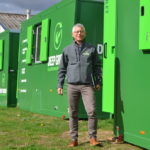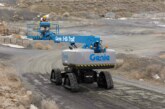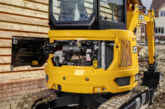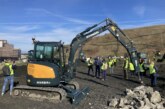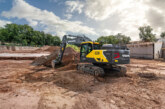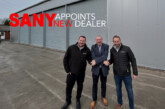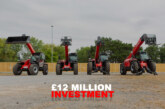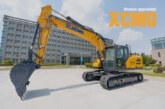When it comes to green solutions one company has proved to be a very deep thinker. Construction Plant News visits the Boss Cabins factory to find out about the latest in solar powered welfare facilities.
As a manufacturer, Boss Cabins is no stranger to a challenge.When Covid- 19 first brought the shutters down on much of our society, for example, this Lincolnshire-based welfare cabin specialist was charged with designing and building bespoke units for rapid deployment at NHS testing centres.Today, in response to an on-going environmental emergency, a major product development has positioned the company as a champion of climate-friendly solutions.
The essence of sustainability is to do more with less and the Boss Cabins Deep Green 2030 range exemplifies that principle in practice. It maximises the amount of sunlight and rainwater harvested from the roof whilst minimising the amount of energy used in operation.The welfare cabins are at least 90 per cent solar powered, with near zero emissions and, whilst a generator may be required to be employed as back up in the darkest days of the winter months, that has also been designed to run on HVO (Hydro- treated Vegetable Oil) and other biofuels.
“The Deep Green 2030 has been so well- engineered that with average levels of sunlight and rainfall, we could completely eliminate the need for a generator or to fill it with water,” explains Boss Cabins Managing Director, James Kearsey,“but in our climate that, of course, cannot be guaranteed so there is the reassurance of an internal combustion engine on standby.At the same time we have worked hard to ensure that service intervals on our patented 3.5kW Stage V Infinity generator – which is already available on our standard range of cabins – are significantly longer than anything else that’s currently on the market, with up to 2,000 hours compared to an industry-standard of 200.”
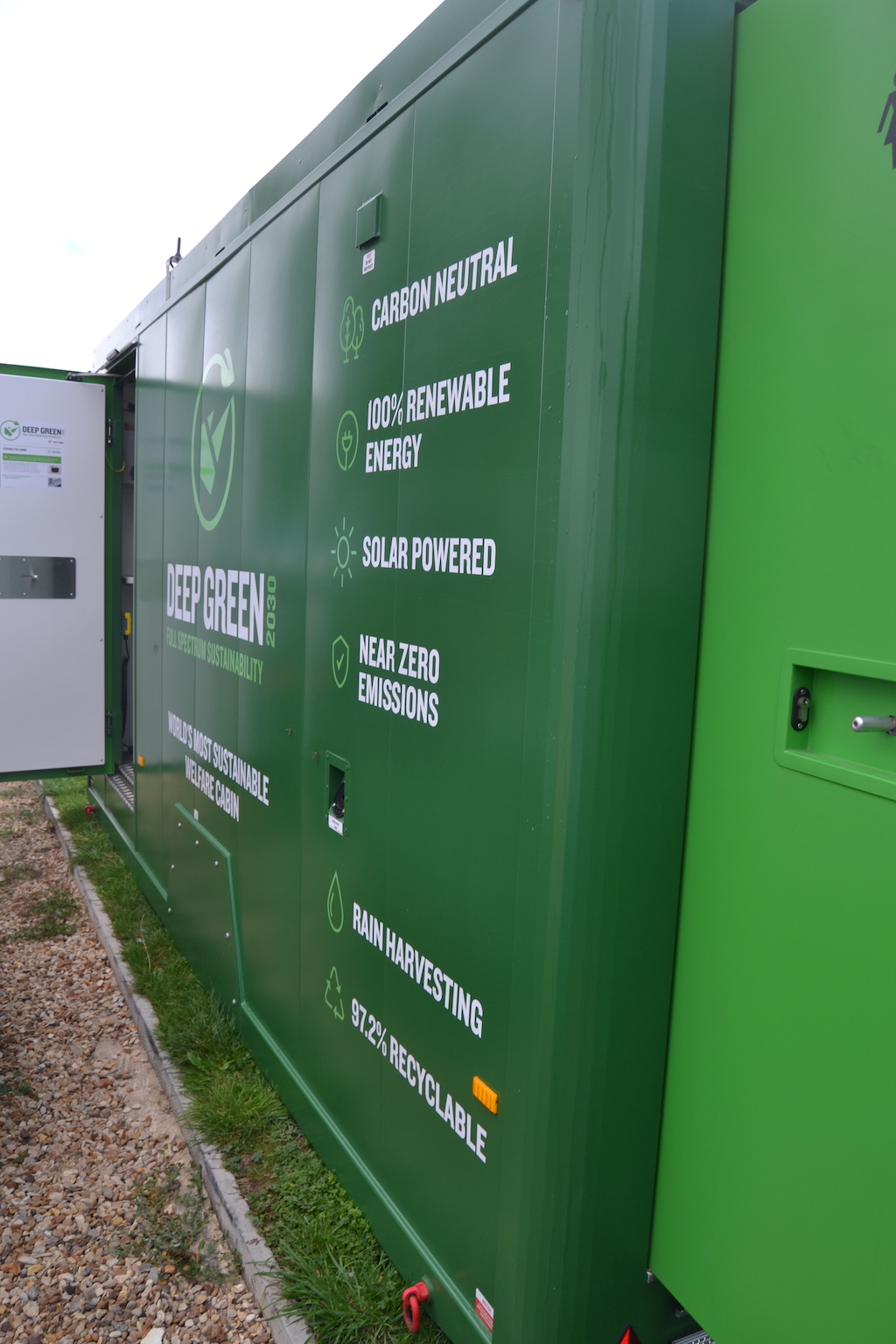
The energy derived from the roof-mounted solar array is stored in a 5.2kWh lithium-ion battery, the ultra-efficient electrical system cutting wastage. All mobile models in the range can be towed by a pick up or van with a 3.5tonne towing capacity, and units can be configured for an individual customer’s requirements.
Boss Cabins Director of Customer Satisfaction and Sales, Sarah Butcher describes some of the other patented Deep Green technologies: “The rainwater harvesting system collects water from the roof, and runs it through a series of filters, to be used for handwashing. In a conventional cabin that handwashing water would be fed straight to a waste tank. By contrast, the Deep Green 2030 sends it to a grey water recycling tank. From there it is utilised in a micro flush toilet system that itself only uses 0.5 litres of water per flush, compared to 6l in a standard flush. In addition, the unit is fitted with waterless, odourless urinals.
All those innovations come together to effectively more than halve the amount of material sent to the waste tank, again reducing service intervals.”
Indeed, utilising renewables and freely available rainfall achieves some very impressive numbers, as James Kearsey reveals:“Taking the example of a conventional diesel-powered 24ft canteen and office model – and comparing it to our Deep Green 2030 unit – we have calculated that an annual saving of 3,260 litres of diesel can be achieved per cabin, which equates to over 8 tonnes of CO2.Add to that the reductions in costs of maintenance engineers attending, and costs can be reduced by over £10,000 per annum.”

Telematics
In addition, Deep Green 2030 utilises a SOLARTrack remote monitoring tool.As a result, the end user – and Boss Cabins engineers themselves – can access and interrogate a whole range of data from an app on their smartphones, or via a desktop computer. Fuel and wastewater tank levels can be viewed, for example, alarms can be set when they reach a designated point, and fleet managers then alerted by email. Not only that but types and patterns of usage can be scrutinised, allowing customers to optimise the use of the cabin, and potentially make further savings, whilst enabling maintenance visits to be scheduled for exactly when they are required.
Boss Cabins was actually the first manufacturer in the sector to produce units in stainless steel, where its competitors have largely continued with mild steel or aluminium foam composite.That more durable and robust construction provides the reassurance of a 25- year anti-corrosion warranty.With 95 per cent of its customers in the rental sector, welfare units will inevitably be abused, but with stainless steel they won’t rust. Not only that but Deep Green 2030 cabins are up to 97 per cent recyclable.
With the removal of the red diesel rebate in April 2022, the adoption of alternative powertrains and renewable sources of energy are a far more appealing proposition, and it is here that calculations of total cost of ownership have to be made.At the same time, Tier 1 contractors are now routinely obliged to demonstrate the impact on the environment of any project at the tendering stage. Both make adopting Deep Green 2030 an attractive option.
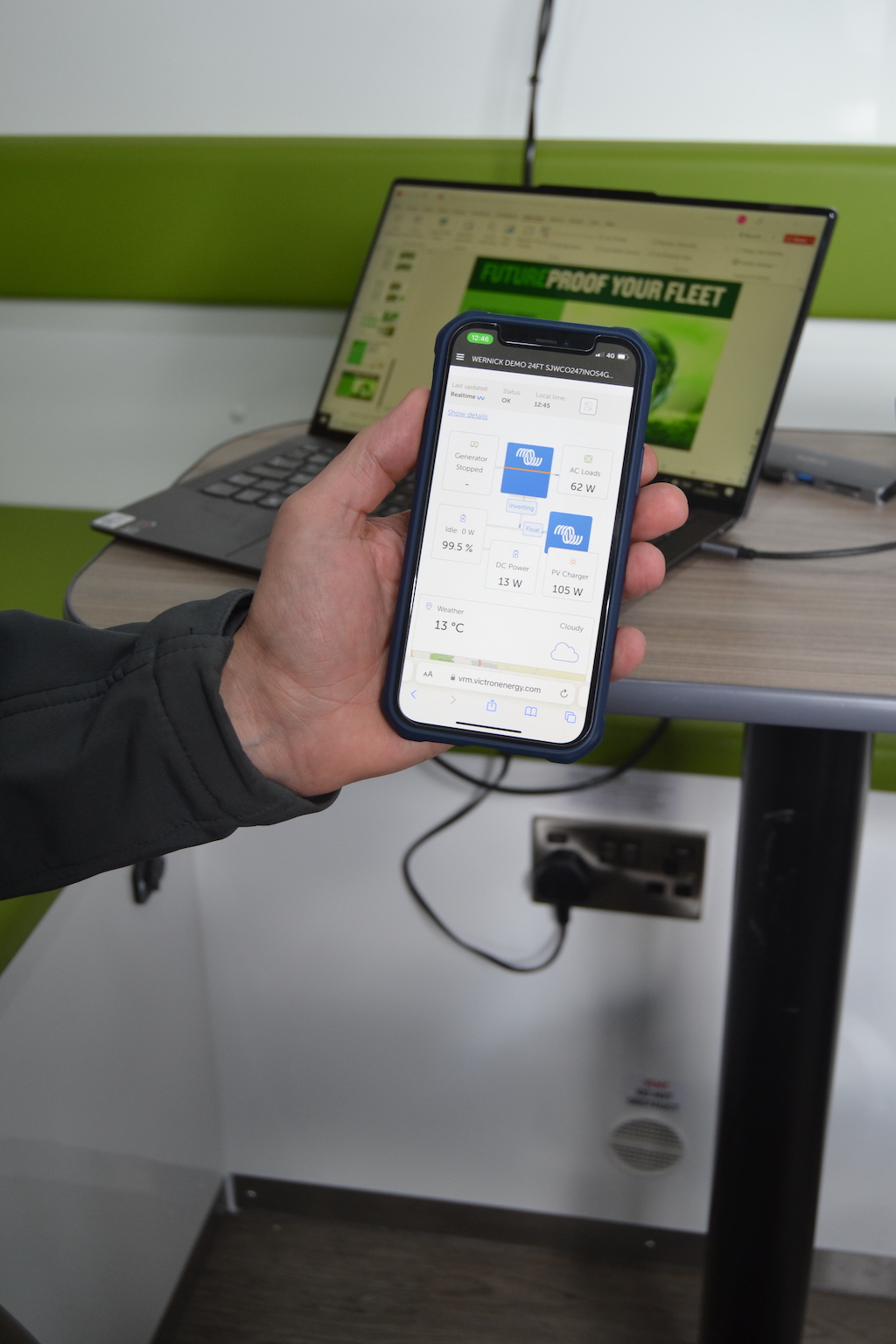
Environmental benefits
The design of these distinctively green solutions dramatically reduces the amount of energy used. Moreover, the combination of rainwater- harvesting with solar panels and intelligent telematics slashes the number of times the cabins need to be visited for servicing.With units owned by hirers potentially located right across the country, the efficiency savings are obvious, as well as the integral environmental benefits.
“In terms of performance, the product has actually exceeded our expectations,” concludes James.“We now have over 400 units in the marketplace, and that has provided a huge bank of data with which we can further develop our ideas.The driver is to save costs but there is also a wider ambition to reduce CO2 and the use of fossil fuels.The beauty of Deep Green 2030 is that it achieves both.”

